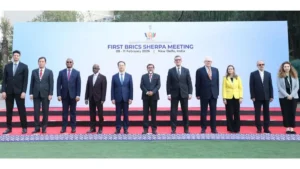Argentine President Javier Milei has officially declined the invitation to join the BRICS (Brazil, Russia, India, China, South Africa) grouping of major emerging economies. The rejection was conveyed through letters sent to BRICS leaders, solidifying Argentina’s decision to abstain from the bloc. The libertarian outsider, who assumed office recently after a significant electoral victory over traditional political parties, had pledged during his campaign not to align Argentina with BRICS.
New Foreign Policy Direction
President Milei’s rejection was grounded in the assertion that Argentina’s membership was “not considered appropriate at this time.” The letters emphasized a departure from the foreign policy approach of the previous administration, indicating a comprehensive review of decisions made earlier. The president highlighted that his geopolitical alignment prioritizes ties with the United States and Israel, eschewing alliances with communist nations.
Shift in Stance Despite Election Rhetoric
Although Milei had initially expressed intentions to sever ties with major trading partners like China and Brazil, his tone has become more conciliatory since taking office. This move underscores the evolving nature of Argentina’s foreign policy under the new leadership. The rejection of BRICS membership aligns with Milei’s commitment to a distinct geopolitical trajectory for the nation.
Questions Related to Exams
-
Why did Argentine President Javier Milei officially reject BRICS membership?
- What specific reasons did President Milei provide in the rejection letters to BRICS leaders?
-
When was Argentina’s membership in BRICS set to take effect, and who were the other new members announced in August?
Please Try to Answer in the Comment Section!!




 World Health Organization Prequalifies N...
World Health Organization Prequalifies N...
 India Hosts First BRICS Sherpas Meeting ...
India Hosts First BRICS Sherpas Meeting ...
 Tarique Rahman Set to Lead Bangladesh? B...
Tarique Rahman Set to Lead Bangladesh? B...








